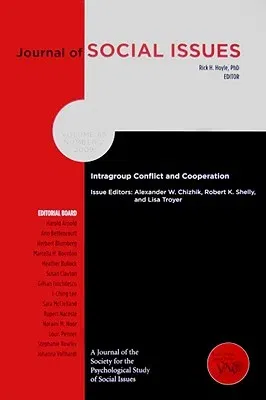Intragroup Conflict and CooperationPaperback, 11 May 2009

Qty
1
Turbo
Ships in 2 - 3 days
In Stock
Free Delivery
Cash on Delivery
15 Days
Free Returns
Secure Checkout

Part of Series
Journal of Social Issues
Print Length
200 pages
Language
English
Publisher
Wiley-Blackwell
Date Published
11 May 2009
ISBN-10
1405199970
ISBN-13
9781405199971
Description
Product Details
Book Format:
Paperback
Country of Origin:
GB
Date Published:
11 May 2009
Dimensions:
23.11 x
14.99 x
1.27 cm
ISBN-10:
1405199970
ISBN-13:
9781405199971
Language:
English
Pages:
200
Publisher:
Series:
Weight:
294.83 gm